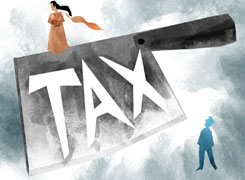New Tax Regime: How Can a Freelancer Like Me Save Money?
Ramalingam Kalirajan |9854 Answers |Ask -Follow
Mutual Funds, Financial Planning Expert - Answered on Aug 13, 2024
He has an MBA in finance from the University of Madras and is a certified financial planner.
He is the director and chief financial planner at Holistic Investment, a Chennai-based firm that offers financial planning and wealth management advice.... more

how can i save money using new tax regime?
Comparing Old vs. New Tax Regime
Under the old tax regime, you could reduce your taxable income by claiming deductions under various sections like Section 80C, 80D, HRA, LTA, etc. However, the new tax regime offers a lower tax rate but does not allow most of these deductions.
Here’s a quick comparison:
Old Tax Regime: Allows deductions under various sections like 80C, 80D, HRA, LTA, etc.
New Tax Regime: Offers lower tax rates but without most deductions and exemptions.
Tax Slabs Under the New Regime
The tax slabs under the new tax regime are as follows:
Income up to Rs. 2.5 lakh: No tax
Income from Rs. 2.5 lakh to Rs. 5 lakh: 5% tax
Income from Rs. 5 lakh to Rs. 7.5 lakh: 10% tax
Income from Rs. 7.5 lakh to Rs. 10 lakh: 15% tax
Income from Rs. 10 lakh to Rs. 12.5 lakh: 20% tax
Income from Rs. 12.5 lakh to Rs. 15 lakh: 25% tax
Income above Rs. 15 lakh: 30% tax
Deciding Between Old and New Regime
To decide whether to opt for the new tax regime, consider the following:
Total Income: Higher income levels might benefit more from the lower tax rates in the new regime, especially if you don't claim many deductions.
Deductions Claimed: If you claim significant deductions under the old regime, sticking with it might be more beneficial. If you don’t claim many deductions, the new regime could be better.
Investment Discipline: If you prefer not to invest in tax-saving instruments or if your lifestyle doesn't support certain deductions, the new regime offers simplicity.
Strategies to Save Money in the New Tax Regime
If you decide to opt for the new tax regime, here are a few strategies to maximize your savings:
Income Tax Rebate (Section 87A): If your taxable income is up to Rs. 5 lakh, you can still claim a rebate under Section 87A, which reduces your tax liability to zero.
Avoid Unnecessary Investments: Under the new regime, you are not required to invest in tax-saving instruments like ELSS, PPF, or NSC just for the sake of deductions. This can free up your cash flow for other investments or expenses.
Focus on Direct Investments: You can focus on investments that suit your financial goals rather than being driven by tax-saving needs. This could include mutual funds, stocks, or even building an emergency fund.
Simplified Tax Filing: The new regime simplifies tax filing as you don’t need to track and claim various deductions. This can save you time and reduce the complexity of your tax return.
Optimize Employer Benefits: If you have employer-provided benefits like NPS contributions, you might still want to consider the old regime. However, under the new regime, your take-home salary might be higher since you’re not contributing to tax-saving investments.
Finally
Choosing the new tax regime can simplify your tax planning and may reduce your tax outgo if you don’t rely heavily on deductions. It’s essential to weigh your income, deductions, and financial goals before making the switch. If you're still unsure, you can consult a Certified Financial Planner to evaluate your specific situation and determine the best approach for you.
Best Regards,
K. Ramalingam, MBA, CFP
Chief Financial Planner
www.holisticinvestment.in
You may like to see similar questions and answers below
Sanjeev Govila | Answer |Ask -Follow
Financial Planner - Answered on Oct 02, 2023
Samkit Maniar | Answer |Ask -Follow
Tax Expert - Answered on May 26, 2024
T S Khurana |500 Answers |Ask -Follow
Tax Expert - Answered on Aug 10, 2024
Milind Vadjikar | Answer |Ask -Follow
Insurance, Stocks, MF, PF Expert - Answered on Sep 13, 2024
Mihir Tanna |1069 Answers |Ask -Follow
Tax Expert - Answered on Feb 13, 2025
Nayagam P P |9487 Answers |Ask -Follow
Career Counsellor - Answered on Jul 27, 2025
Radheshyam Zanwar |5872 Answers |Ask -Follow
MHT-CET, IIT-JEE, NEET-UG Expert - Answered on Jul 27, 2025
Nayagam P P |9487 Answers |Ask -Follow
Career Counsellor - Answered on Jul 27, 2025
Radheshyam Zanwar |5872 Answers |Ask -Follow
MHT-CET, IIT-JEE, NEET-UG Expert - Answered on Jul 27, 2025
Radheshyam Zanwar |5872 Answers |Ask -Follow
MHT-CET, IIT-JEE, NEET-UG Expert - Answered on Jul 27, 2025
Radheshyam Zanwar |5872 Answers |Ask -Follow
MHT-CET, IIT-JEE, NEET-UG Expert - Answered on Jul 27, 2025
Radheshyam Zanwar |5872 Answers |Ask -Follow
MHT-CET, IIT-JEE, NEET-UG Expert - Answered on Jul 27, 2025
Radheshyam Zanwar |5872 Answers |Ask -Follow
MHT-CET, IIT-JEE, NEET-UG Expert - Answered on Jul 27, 2025
Nayagam P P |9487 Answers |Ask -Follow
Career Counsellor - Answered on Jul 27, 2025
Nayagam P P |9487 Answers |Ask -Follow
Career Counsellor - Answered on Jul 27, 2025

























